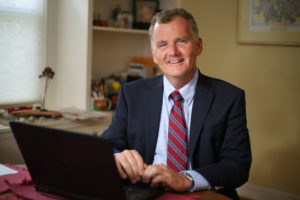
From Platitude to Spiritual Practice
During a crisis, we need trustworthy practices. In challenging circumstances, when our bodies are anxious and tense, learners and teachers need a sturdy undergirding to navigate life as thoughts race and emotions fluctuate. At least, that is my view as a pastoral theologian.
Ten years ago, Denise Dombkowski Hopkins and I published a book entitled, Grounded in the Living World: The Old Testament and Pastoral Care Practices (Eerdmans, 2010). We briefly explored the unfortunate use of platitudes in ministry; phrases such as ‘it could be worse,’ ‘she is in a better place,’ ‘look on the bright side.’ Clichés and platitudes are superficial thoughts and comments that stifle further exploration as they reduce complexity to simplicity. Proof-texting with the Bible also functions as a platitude. People are not comforted and much harm can occur through the use of these seemingly innocuous remarks. In a time of crisis, we realize how unsatisfying a platitude can be.
A few weeks ago, I was interviewed for a podcast on the topic of care during a pandemic. I responded to a question about “rethinking” leadership practices by suggesting we need not “over think.” A former student and current pastor wrote saying how much he appreciated the passing reference. We need practices that can hold us together since many people are, in his words, “operating in a type of panic mode that is causing an overload to our systems.” Platitudes such as ‘this, too, shall pass,’ and ‘God is bigger than this virus’ serve as knee jerk thought responses that prematurely call the question rather than open the conversation.
Recently, I was listening to recording of Joko Beck, founder and teacher at the Zen Center of San Diego. Joko died in 2011, but her teaching lives on. She had a no-nonsense, platitude-free style. I became familiar with her teaching while a Ph.D. student in Claremont, California. I relearned what I had heard many times before and seek to communicate in my pastoral care classes: meditation practice helps to release the thoughts that loop in the mind. Meditation is a kind of unloading of the system. Contemplative prayer and other spiritual practices serve a similar purpose: to let go of the thoughts and tap into God’s presence.
Psalm 46 calls for calm amidst a creation in chaos and a world in turmoil. “Be still, and know that I am God! I am exalted among the nations, I am exalted in the earth” (v 10). “Be still” means “to stop, desist, don’t do anything.” That’s the heart of spiritual practice: to be still in a world turned upside-down. Even if you cannot be calm, I tell students, at least practice being less anxious than the people in your care. The world teaches us to keep pushing the “thinking” panic button, but pastoral leaders need to model a healing alternative for showing up in the world. That alternative allows for the embrace of our whole experience regardless of whether we are seething in anger at injustice, fearing for others’ and our own lives, grieving losses, or reeling with anxiety. Embodied spiritual practice makes space for it all.
I have discovered it easier to foster such practices in the online class. I find myself teaching more boldly. Students can engage freely without being self-conscious. They get credit whether or not they engage the practices, as long as they write a brief reflection. Most students do all of them; a few opt out on occasion. The evaluation method signals their inner authority is what matters. Some probably still write to please me. Overall, though, I trust students to learn through their own meaningful activity.
The abrupt shift to online teaching is simply a mirror of a new unknown reality into which we have all been catapulted. I know myself as a co-learner with class participants. I engage the practices, too. I know that being with fear and anxiety is immensely difficult as agitation stirs in my body. I know being present in and to experience takes effort. Yet, I also know from years of practice, that being still puts us in touch with the energy forces at work within and around us. All is quiet in the eye of the hurricane, but getting there/being here is a challenge.
Platitudes run roughshod over experience. They put a superficial happy face on matters. Yet another possibility exists. The poet Rumi muses: “Out beyond ideas of wrongdoing and rightdoing, there is a field. I’ll meet you there.” Spiritual practice allows for holding the both/and together instead of denying the negative or forcing the positive. It is the field of being and heart of pastoral caring.
Suggested spiritual practice drawn from various traditions:
- • Sit in a comfortable position
- • Notice and let go of all platitudes/thoughts/feelings
- • Focus on your breath and/or sense your heartbeat
- • Acknowledge what’s happening in your body
- • Be still for a while
I’ll meet you there in the stillness.
Leave a Reply